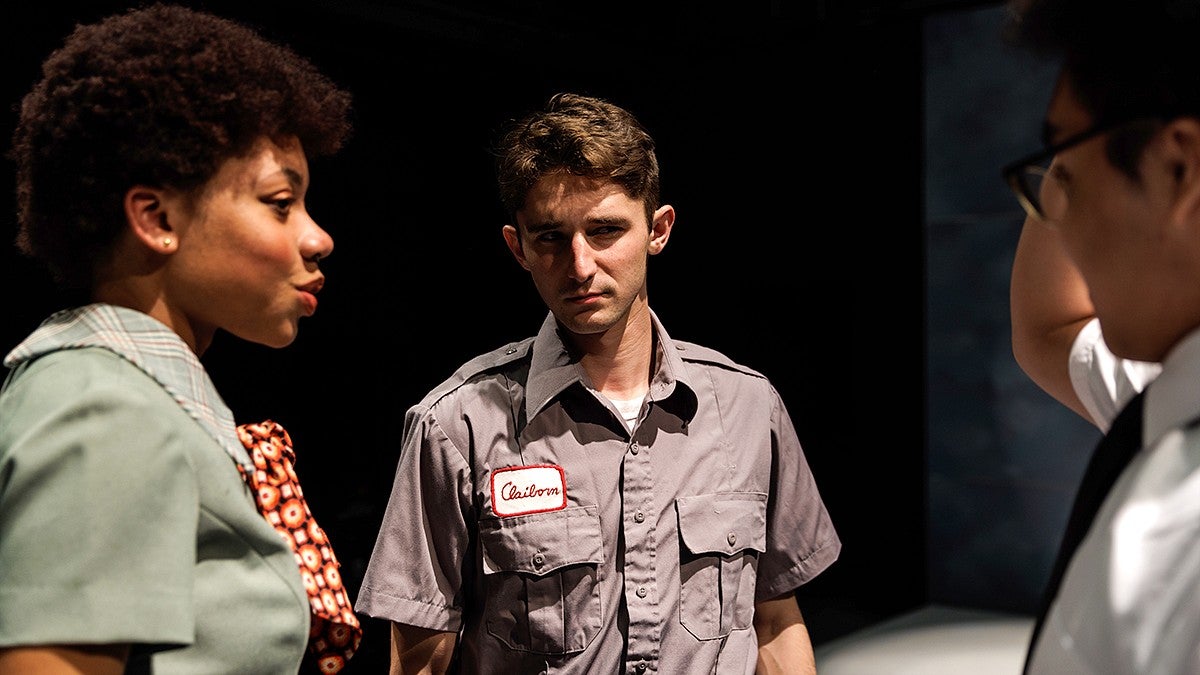Although schools had been desegregated since the 1954 landmark Brown v. Board of Education Supreme Court ruling, the law had been largely ignored in Durham, North Carolina — until 1971, when a Black community activist and a Klansman were thrown together to find a solution.
The stage of the UO’s Hope Theatre, part of the College of Arts and Sciences, is the setting for their epic confrontation in University Theatre’s upcoming production “The Best of Enemies,” which is based on a true story.
Shows will be March 4, 10, 11, 17 and 18 at 7:30 p.m. and March 12 at 2 p.m.
Ann Atwater is an outspoken civil rights activist, tirelessly championing the poor Black people in her community. Gas station owner Claiborne Paul “C.P.” Ellis is president of the local chapter of the Ku Klux Klan. When the government enlists Bill Riddick, an expert organizer skilled in a collaborative process known as “charette” to come to Durham and help mediate a 10-day public meeting, he chooses Atwood and Ellis as co-chairs.
As Atwood and Ellis are forced to interact with one another over the course of the intense meeting, they discover that their life experiences aren’t all that different: both grew up in poverty and each share a common concern for the education of the young people in their community, including their own children. Ultimately, they recognize that their anger and hatred of each other is misplaced, which allows them to resolve their differences and identify the true enemy — the system that has held their communities down.
Stan Coleman, a retired professor of theater and speech at Nicholls State University in Thibodaux, Louisiana, and current adjunct speech instructor at Lane Community College, will direct the racially charged play. As a gay, African American man, he has experienced discrimination firsthand, but believes that people can change.
“What happens in the story is nothing short of a miracle, these two people changing their viewpoints about each other and about the conflict of the races,” Coleman said. “I believe that prejudice is caused by three things: ignorance, background and peer pressure. Every one of those things is operating in this play.”
During college, Coleman acted and directed Black theater and focused his dissertation for his doctorate on Black theater with the goal of bringing a minority voice to the stage. Five years ago, he partnered with local director/producer Carol Dennis to co-found Minority Voices Theatre, a program dedicated to producing stories like “The Best of Enemies.”
For “Enemies,” he collaborated with Department of Theatre Arts associate professor Michael Malek Najjar, who has been a passionate advocate for developing and producing plays with diverse themes and casts.
The play, though a factual account, is also controversial because a racial slur is used frequently.
“I had to ask all of the actors if they were comfortable using that word,” Coleman said. “They all were, and they all said, ’You know, it’s history.’ We try sometimes to whitewash history and pretend that this never happened, but if we don’t ever have to face it then it continues to happen. The best thing is for people to have to face it even if it’s an ugly scene.”
Coleman hopes the takeaway for the audience will not only be a better understanding of a historical event but also a recognition that change takes time and courage, especially for someone like Ellis who was so deeply entrenched in the Ku Klux Klan.
“We cannot make changes until we can listen to each other, but I hope that people will go away with the idea that change is possible,” Coleman said. “If a man like C.P. Ellis can change, then almost anybody can.”
—By Sharleen Nelson, University Communications


